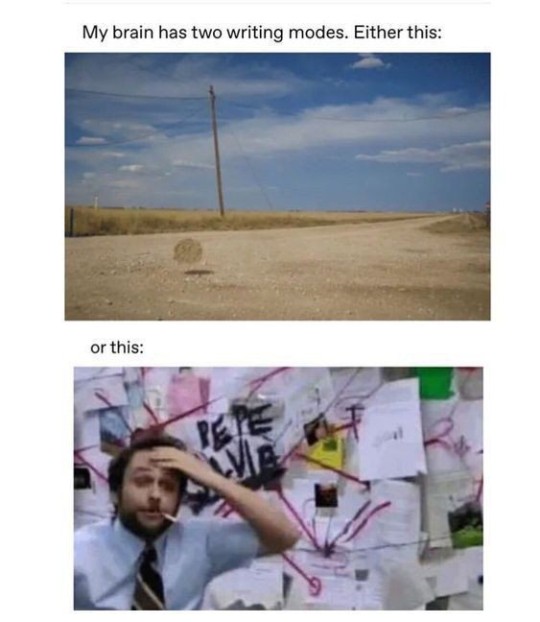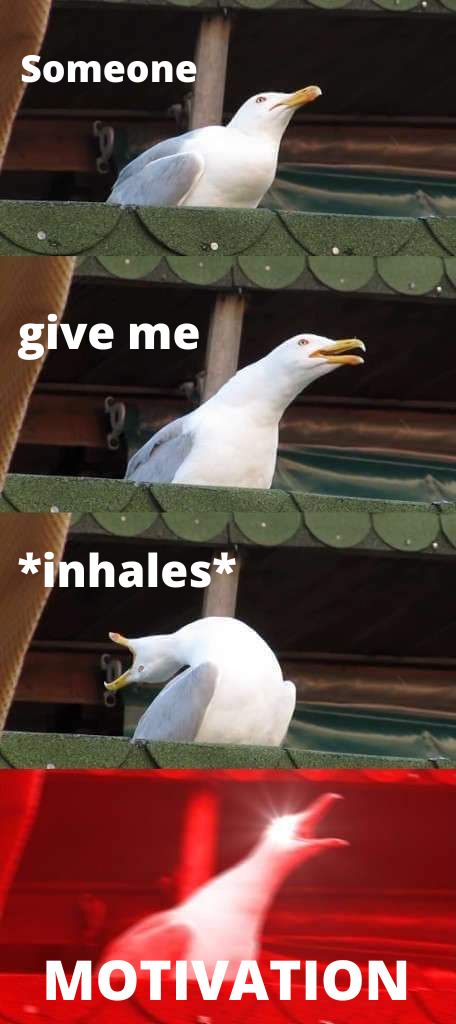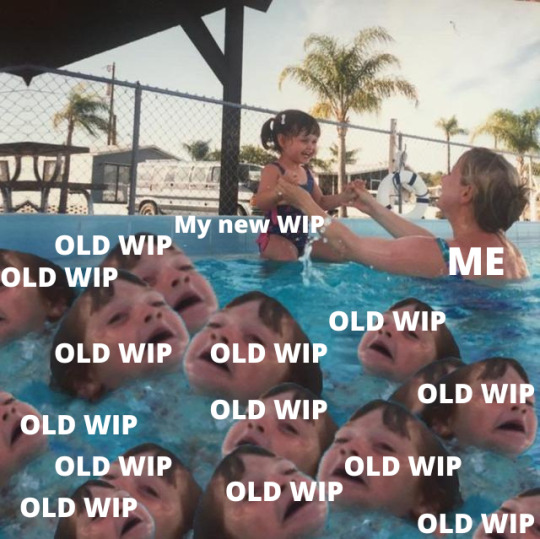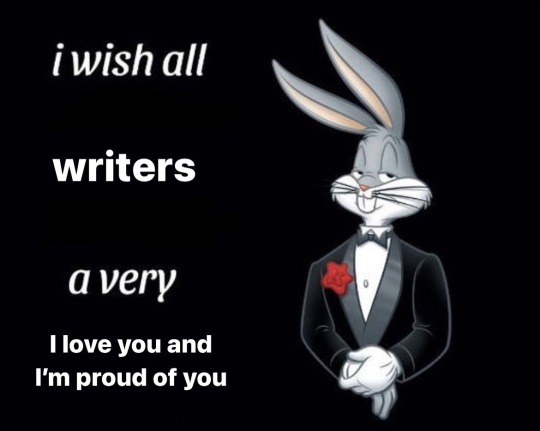I am a queer autistic nonbinary writer! I wrote a book about two friends to enemies to lovers who play ice hockey, called "Cryptids & Canines"! Ask my anything about my novel or writing!
Last active 3 hours ago
Don't wanna be here? Send us removal request.
Text
writer’s block (dry) = no desire to write, no ability to write (bearable)
writer’s block (wet) = HUGE desire to write, no ability to write (very evil)
83K notes
·
View notes
Text
When you read something you wrote as a teenager

It means you’ve gotten better as a writer
1K notes
·
View notes
Text
Being a writer means being an artist. So start perceiving your writing as art, because it is a form of art, it is a form of self-expression, and you should appreciate your art.
797 notes
·
View notes
Text
On Editing -- a thing to keep in mind
Okay, I've been sitting on this one for literal years. But I think I finally have the language to take a stab at explaining it.
Not all edits makes sense for all narrative voices.
What the hell do I mean by this?
Take Tolkien, for an extreme example. The narrative voice in LotR, The Hobbit, The Silmarillion etc. is generally very formal and poetic. It intends to mimic the speech patterns of Old English epics like Beowulf. So sentences like **flips to a random page in Fellowship**
With that he jumped out of his chair, and with a bound took a candle from the chimney-shelf and lit it in the flame that Goldberry held; then he danced about the table.
This does many things that are often considered writing faux-pas. And yet, it works (unless your the kind of person that doesn't like Tolkien's prose, which is valid.) Most writers would write this sequence more like:
He jumped out of his chair. He grabbed a candle from the chimney-shelf and lit it with the flame Goldberry held out to him. Then, he danced around the table.
Or they might omit a few details:
He jumped up to light a candle with Goldberry's flame. Then, he danced around the table.
Tolkien's prose contains a filler words that most people would be advised to cut out, such as "with that". It uses several words where one will do, such as "with a bound" instead of "bounding". It uses archaic wording such as, "lit it in the flame," instead of "lit it with the flame," "took a candle from," instead of "grabbed a candle off," and "danced about," instead of "danced around." And it uses much longer sentences with multiple ideas strung together.
But it's not bad writing. It is giving off a certain effect, the effect of reading a epic 1000 year old poem.
I've started to become more careful about how I edit because each of the three examples given gives a very different effect and all of them are enjoyable to read. When editing, I've started asking myself
What is the effect the writer is going for? Does this add to it?
How casual or formal is their prose, overall?
A writer going for a more modern or casual feel will probably write like the second example, using modern word choice, cutting out filler words, and using strong verbs.
A writer going for a quick, snappy feel will probably write like the third example, focusing only on the most important actions and details.
Another example is "she stated firmly before exiting the room" versus "she said firmly, then left the room." Both of these are technically correct, but one might feel more awkward than the other. If the prose is really casual elsewhere, words like "stated" and "exiting" are going to draw unwanted attention. If the prose is more formal, "stated" and "exiting" may pack more of a punch than "said" and "left".
Grammar conventions can sometimes be ignored as well if it suits the voice. "He was hungry again," is technically more correct than, "he was again hungry," because adverbs should follow the verb. But more formal prose, or prose going for an archaic or Tolkienesque feel, might prefer the second option. The first might feel too casual.
So yeah, pay attention when editing that you are helping to bring the narrative voice out, rather than cutting it out just because writing advice says not to use long sentences, filler words, archaic language, too many words, formal language, slang, a particular word order etc.
1K notes
·
View notes
Text
Write for yourself. No, this approach is not selfish. Write for yourself because you need to fall in love with your story. You will have to edit this thing, you will have to rewrite some parts, you will have to work on it. If you don’t like it, you won’t find enough motivation to finish it. Don’t write for the market, write for yourself.
6K notes
·
View notes
Text
writer’s brains are like btw want to hear about this random scene idea that will make you scream and cry and throw up before you go to sleep
3K notes
·
View notes
Text
You don’t have to be a perfect writer to start working on your story. You’ll learn so many things as you go. The most important thing is to actually start.
5K notes
·
View notes
Text
Both Sage and Mateo have autism!!! It’s so important to have representation in stories.
"should autism exist in my fantasy story?" yes. "should psychosis exist in my fantasy story?" yes. "should personality disorders exist in my fantasy story?" yes. "should ADHD exist in my fantasy story? should intellectual disabilities exist in my fantasy story? should dissociative disorders exist in my fantasy story? should trauma disorders exist in my fantasy story? should anxiety disorders exist in my fantasy story? should mood disorders exist in my fantasy story? should--"
yes, yes, yes, yes, yes, yes.
you don't have to include their real actual names and you don't have to have main characters with every single one of these things. But neurodivergent and mentally ill people should EXIST in fantasy stories and fantasy societies, because we exist in real life. We deserve to be acknowledged.
8K notes
·
View notes
Text
Writing is hard. It stretches your creativity until you see holes in it, or worse, your plot. It can be lonely. It can be tiring. It can hurt your brain, and your pride, and your heart. It can feel like the worst thing you've ever done.
But it's worth it.
You're worth it.
So take care of yourself, okay? Take breaks, drink fluids, do whatever self-care you can do, no matter how small. Remember, there are people who care, and there are readers who need you - your story, your perspective, your impact.
And if you don't hear this from anyone else today, I'm so proud of you.
7K notes
·
View notes
Text
"This is childish, Sage," Mateo says as he stands himself back up.
"Ooooh! Mister All-Star speaks!" I mock. He steps closer to me, towering over me. I feel my heart quickening.
"Stop making a scene," he hisses, looking down at me and staring daggers. It makes me throw my head back and laugh for some reason.
"Oooh! You want a scene?! I can show you a scene!" I challenge him.
Kris puts a hand on my shoulder and tugs on it in an effort to bring me back to our table. I try to shrug him off.
"Sage, just leave it. He's not worth it."
He's not worth it? No, Kris misunderstands. He's worth everything to me.
I shake my head at Mateo and laugh at him. "I'll see you in the rink, Finnegan."
- Chapter 1: The Banquet from Cryptids and Canines
#Cryptids and Canines#Original character#OC#Sage Malfatto#Mateo Finnegan#Kris Kurtz#my novel#original novel#nanowrimo#ice hockey#gay#lgbtq#lgbt#queer#queer author#autistic author#writerblr#writer
0 notes



